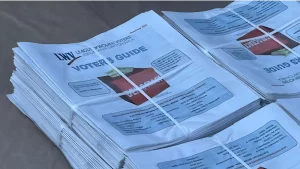(State positions can be found on the LWV Ohio Agenda for Action, and National positions can be found in the Impact on Issues document.)
Government
Dayton
- LWVGDA supports the council-manager form of government as provided in the Dayton City charter.
- LWVGDA supports the Dayton Municipal Income Tax as a means of financing the cost of local government
Kettering
- LWVGDA supports the charter form of government.
- LWVGDA supports an adequate revenue for financing municipal government.
Education
LWVGDA supports interrelationship of school districts to broaden education opportunity, where financially acceptable and accepted by participating members. LWVGDA Units have detailed positions on schools, development of quality in schools and financing in Dayton, Miamisburg, and West Carrollton.
Human Resources
Human Services Levy of the Montgomery County: Supports efficient and economical government that requires competent personnel, the clear assignment of responsibility, adequate financing and coordination among the different agencies and levels of government.
Children Services: Supports protection and care of neglected, abused or dependent child, strengthening family life and providing services for the child who cannot be returned home.
Developmental Disabilities Services: Supports Board of DDS, and community based treatment.
Indigent Ill: Supports county funds for health care for the “indigent.”.
Public Health – Dayton and Montgomery County: Supports the structure of a “combined health district” as an effective method of providing health services in Montgomery County
Mental Health: Supports the Alcohol, Drug Addiction, and Mental Health Services Board (ADAMHS), and the services they provide; supports community-based care concept of treatment with strong emphasis on residential facilities, aftercare programming and case management.
Aging: Supports a viable system that plans for and supports the complex needs of the community’s aging population with shared public and private responsibility.
Justice
Adult: Supports a Montgomery County criminal justice system that works toward fairness in dealing with individuals from the time of entering until leaving, an opportunity for public access and participation, an opportunity for the offender to participate in choices; supports community-based corrections depending on financing, staffing, screening of participants, and provisions for citizen involvement.
Juvenile Justice: Supports the philosophy expressed in Section 2151.01 of the Ohio Revised Code and its full implementation by state and local agencies. The LWVGDA also supports:
- the principle that children are not adults and that their treatment within the juvenile justice system should relate to their stage of development
- rehabilitation as the purpose of the juvenile justice system. # protection of children’s legal rights
- the development, establishment, and enforcement of state standards for detention and treatment facilities. These standards should be continually reviewed for improvement
- development within each county or multi-county region of a comprehensive system of children’s services for the prevention and treatment of children at risk as well as juvenile offenders; a system that utilizes the resources of the extended community to give each individual child a continuum of care
- provision of public innovative alternative educational services, K through 12, to address the specific and individual needs of children who do not perform successfully in, or face expulsion from, the traditional public school setting
- philosophy of a restorative system of justice for children as a dispositional option for juvenile court judges
- development and utilization of gender-specific treatment programs
- rights of juveniles to unbiased treatment regardless of race or ethnicity.
Natural Resources
(An Inter-League Position) LWVGDA endorses continued citizen action to protect, maintain and improve the Little Miami and Stillwater Rivers, their aquifer recharge areas and their ecosystems. LWVGDA also favors protection by local governments through zoning and subdivision regulations and building codes as well as other environmental legislation. LWVGDA supports seeking funds, both public and private, for this purpose.




